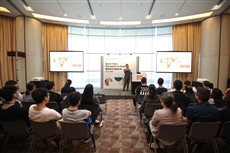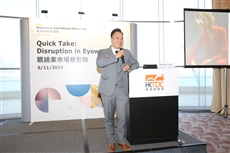Three ways start-ups can disrupt global eyewear market
7 November 2019 – Start-ups are creating a disruptive wave in the traditional retail eyewear market according to international research institute Coresight Research, which revealed the latest trends in the global eyewear market at a seminar held yesterday as part of the 27th edition of the HKTDC Hong Kong International Optical Fair.
The global eyewear market was valued at US$127 billion last year and is forecast to reach US$141 billion by 2023, according to Coresight, which specialises in delivering data-driven market insights for a range of industries globally. Bricks-and-mortar stores currently account for 87% of global retail eyewear sales because of the preference for personal services such as measurement and adjustment, while online sales – which make up the rest of the market – continue to experience steady growth.
Albert Chan, Head of the Hong Kong Office for Coresight, explained that in the essentially oligopolistic global eyewear industry – which has been long dominated by four giant players, namely EssilorLuxottica, GrandVision, Johnson & Johnson and Alcon – start-ups are beginning to disrupt both the online and offline eyewear markets in innovative ways.
Direct-to-consumer sales model cuts costs
One method of disruption is to use direct-to-consumer (D2C) sales models to bring down the retail prices by up to 90%, explained Mr Chan, which appeals to more price-conscious consumers who are looking for cheaper alternatives to speed up the replacement cycle.
He added that one way to help eyewear manufacturers cut production times significantly and bring a wider variety of eyewear products to consumers is to adopt 3D printing, which aligns with the growing trend for product customisation and personalisation.
Lithuanian start-up Dear Deer Eyewear, for example, helps consumers produce their own glasses using 3D printing technology, while another start-up, New York-based King Children, uses 3D mapping software to make unique glasses according to consumers’ facial features.
Augmented reality offers an optical solution
Different technologies are also helping to open new doors for start-ups in the eyewear market, with Mr Chan recognising the growing popularity of smart eyewear that has encouraged technology providers and lens manufacturers to develop smart optical solutions for augmented reality (AR) glasses.
Mr Chan cited the example of Korean start-up LetinAR that has developed lenses that reflect the light from the microdisplay and guide it into the pupils of the eyes. This allows the glasses wearer to view the virtual image from the microdisplay at the same time as the image from the real world.
Sustainability in focus
While spectacle lenses, eyewear frames, sunglasses and contact lenses are named by Coresight as the four key product categories in the global eyewear market, sustainable eyewear is seen to have great growth potential in the future as people become increasingly motivated to live an eco-friendly life. “This has created space for start-ups to develop products that differentiate themselves from their mass-market rivals,” Mr Chan said.
Ukrainian start-up Ochis has developed the world’s first eyewear made from coffee grounds. The high-quality biodegradable and aromatic compound used to make the spectacle frames has gained popularity by offering a new sustainable alternative in the global eyewear market.
Another example of sustainable eyewear is from Australian company Dresden Vision which has turned empty shampoo bottles into glasses frames by using a closed-loop injection system to ensure there is no negative impact on the environment.
|
|
|
The 27th edition of the HKTDC Hong Kong International Optical Fair staged a seminar under the theme “Quick Take: Disruption in Eyewear” yesterday, with an expert from international research institute Coresight Research discussing the latest trends in the global eyewear market |
|
|
|
Albert Chan, Head of the Hong Kong Office at Coresight Research |
Media enquiries
Please contact the HKTDC’s Communication and Public Affairs Department:
Snowy Chan Tel: (852) 2584 4525 Email: snowy.sn.chan@hktdc.org
Natalie Wong Tel: (852) 2584 4472 Email: natalie.hy.wong@hktdc.org
About HKTDC
Established in 1966, the Hong Kong Trade Development Council (HKTDC) is a statutory body dedicated to creating opportunities for Hong Kong’s businesses. With 50 offices globally, including 13 on the Chinese mainland, the HKTDC promotes Hong Kong as a platform for doing business with China, Asia and the world. With more than 50 years of experience, the HKTDC organises international exhibitions, conferences and business missions to provide companies, particularly SMEs, with business opportunities on the mainland and in international markets, while providing business insights and information via trade publications, research reports and digital channels including the media room. For more information, please visit: www.hktdc.com/aboutus.



